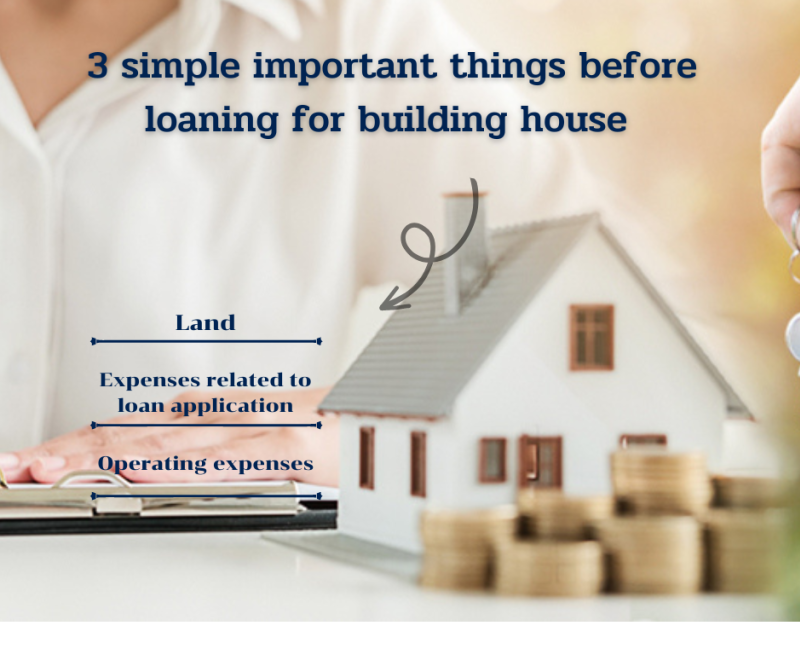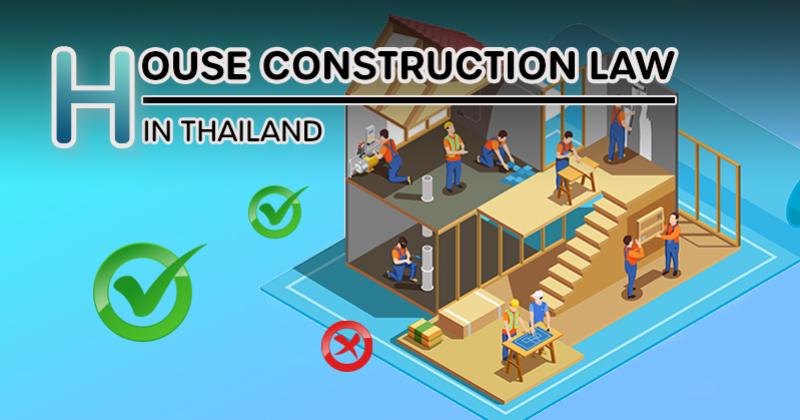
สร้างเมื่อ : 7 เม.ย. 2566
แก้ไขล่าสุดเมื่อ : 8 เม.ย. 2566
ปลูกบ้านในฝันก็กู้ได้ (100%) นะรู้ยัง
“สินเชื่อบ้าน” ถ้าพูดถึงคำนี้หลายคนมักจะเข้าใจว่า เป็นการกู้เงินกับธนาคารเพื่อนำเงินไปซื้อบ้าน ซึ่งเข้าใจแบบนี้ก็ไม่ได้ผิดอะไร แต่ไม่ถูกทั้งหมดค่ะ เพราะในความเป็นจริงที่ไม่ค่อยมีใครรู้สักเท่าไร คือเราสามารถขอสินเชื่อบ้าน เพื่อนำเงินไปปลูกสร้างบ้านได้เช่นกัน โดยถ้ายิ่งมีที่ดินเป็นของตนเองด้วยแล้ว “แบบนี้กู้ได้ 100% เลยนะ” เท่ากับว่าเราไม่ต้องควักเงินจ่ายค่าปลูกสร้างบ้านเลย น่าสนใจขนาดนี้ ลองมาทำความรู้จักเลยค่ะ
1. มีแค่ที่ดินก็กู้สร้างบ้านได้
หากเรามีที่ดินแล้วต้องการกู้เงินเฉพาะค่าปลูกสร้างบ้านสามารถทำได้ค่ะ ซึ่งธนาคารจะพิจารณาวงเงินกู้ด้วยการประเมินมูลค่าบ้านจากแบบแปลนการก่อสร้างบ้านหรือที่เรียกว่า “แบบพิมพ์เขียว” และประเมินมูลค่าราคาที่ดินไปพร้อม ๆ กัน โดยวงเงินที่ให้กู้จะไม่เกิน 100% ของราคาค่าก่อสร้างบ้าน(ตามสัญญาว่าจ้าง) และไม่เกิน 90% ของราคาประเมิน ที่ดินพร้อมบ้าน (กรณีกู้เงินซื้อที่ดินพร้อมขอกู้ปลูกสร้างบ้าน วงเงินกู้จะได้ไม่เกิน 90% ของราคาซื้อขายที่ดินรวมกับราคาค่าก่อสร้างตามสัญญาว่าจ้าง และไม่เกิน 90% ของราคาประเมินที่ดินพร้อมบ้าน) แต่ทั้งนี้ก็ต้องดูรายได้เปรียบเทียบกับภาระหนี้ประกอบด้วย ถ้าใครไม่มั่นใจอยากประเมินดูก่อนก็สามารถเข้าไปปรึกษากับทางธนาคารได้ค่ะ
ส่วนการให้เงินกู้ปลูกสร้างบ้านนั้น ธนาคารไม่ได้จ่ายให้ทั้งก้อนนะคะ เราจะได้รับเงินแบบทยอยรับเป็นงวด ๆ ตามผลงานการก่อสร้างที่ระบุไว้ในสัญญาเงินกู้ ซึ่งดอกเบี้ยก็ถูกทยอยคิดตามที่เราเบิกเงินกู้ไปนั่นเองค่ะ
ตัวอย่างเช่น งวดที่ 1 เบิก 200,000 บาท เมื่อวางผังและปรับพื้นตอกเสาเข็มเรียบร้อย จากนั้นสามารถเบิกงวดที่ 2 เป็นเงิน 300,000 บาท เมื่อตั้งเสาและเทพื้นเสร็จเรียบร้อย ซึ่งในการเบิกเงินแต่ละงวด ธนาคารจะทำการประเมินความคืบหน้าของการก่อสร้างจริงว่า เป็นไปตามเงื่อนไขที่ระบุไว้ในสัญญาเงินกู้หรือไม่ค่ะ
2. เอกสารที่ต้องใช้ในการยื่นกู้
สำหรับการยื่นกู้ปลูกสร้างบ้านกับธนาคาร นอกจากจะต้องเตรียมเอกสารแสดงตน เช่น บัตรประชาชน ทะเบียนบ้าน และเอกสารแสดงรายได้ เช่น สลิปเงินเดือน หนังสือรับรองเงินเดือน รายการเดินบัญชี (Statement) แล้ว เรายังต้องเตรียมเอกสารต่าง ๆ ที่เกี่ยวข้องกับการปลูกสร้างอีกด้วยค่ะ ได้แก่
• เอกสารสิทธิของที่ดิน (โฉนดที่ดิน) พร้อมสารบัญจดทะเบียนทุกหน้า
• แบบแปลนการก่อสร้าง (พิมพ์เขียว) สามารถจ้างสถาปนิกในการออกแบบ หรือใช้แบบมาตรฐานของหน่วยงานราชการในพื้นที่ก็ได้
• ใบอนุญาตก่อสร้าง แน่นอนว่าก่อนที่จะลงมือปลูกสร้างบ้านได้นั้น ต้องได้รับอนุญาตจากหน่วยงานราชการในพื้นที่ที่เกี่ยวข้องเสียก่อน เช่น หากอยู่ในเขตกรุงเทพมหานคร ก็สามารถยื่นขอใบอนุญาตก่อสร้างสำนักงานเขตในพื้นที่ หรือหากอยู่ในเขตภูมิภาค สามารถยื่นขอได้ที่องค์การบริหารส่วนตำบล เป็นต้น ซึ่งการขอใบอนุญาตก่อสร้างจะต้องมีแบบแปลนบ้านให้ตรวจสอบด้วย
• สัญญาว่าจ้างก่อสร้างกับผู้รับเหมา ต้องมีการระบุเงื่อนไขการเบิกเงินของผู้รับเหมาตามความคืบหน้าของการก่อสร้างบ้าน พร้อมมีรายละเอียด BOQ (Bill of Quantity) ซึ่งจะบอกว่าบ้านของเราใช้วัสดุอะไร มีมูลค่าเท่าไรในแต่ละรายการ เช่น ห้องนั่งเล่น ห้องนอน พื้นปูด้วยกระเบื้อง ลามิเนต หรือปาร์เก้ ขนาดพื้นที่ใช้สอยเท่าไร เป็นต้น
3. ค่าใช้จ่ายที่ต้องเตรียม
ในส่วนของค่าใช้จ่ายที่ต้องเตรียมหลัก ๆ มีดังนี้ค่ะ
• ค่าใช้จ่ายเกี่ยวกับการปลูกสร้างบ้าน เช่น
- ค่าใช้จ่ายในการออกแบบบ้าน หากใช้สถาปนิกในการออกแบบ ค่าออกแบบจะขึ้นอยู่กับการตกลงกันค่ะ โดยอาจคิดเป็นเปอร์เซ็นต์ของค่าก่อสร้าง เช่น ค่าออกแบบ 5% ของค่าก่อสร้าง หรือ คิดค่าใช้จ่ายแบบเหมาไปเลย เช่น ค่าออกแบบ 50,000 บาท เป็นต้น ต้องบอกว่าการปลูกสร้างบ้านนั้นเราสามารถจัดการเองได้ทุกอย่างค่ะ แต่อาจจะยุ่งยากสักหน่อยและงบก็อาจบานปลาย การใช้บริการบริษัทรับสร้างบ้านที่ให้บริการครบวงจร ตั้งแต่การออกแบบบ้าน ขอใบอนุญาตก่อสร้าง ไปจนถึงการก่อสร้างบ้านแล้วเสร็จ จึงอีกทางเลือกหนึ่งที่ช่วยอำนวยความสะดวก ช่วยคุมงบประมาณ รวมถึงดำเนินการในเรื่องต่าง ๆ ให้กับเราค่ะ
• ค่าใช้จ่ายเกี่ยวกับการยื่นกู้ เช่น
- ค่าสำรวจและค่าประเมิน คิดขั้นต่ำอยู่ที่ประมาณ 3,000 บาท
- ค่าอากรแสตมป์สัญญาเงินกู้ 0.05% ของวงเงินกู้ (ไม่เกิน 10,000 บาท)
- ค่าจำนอง 1 % ของวงเงินกู้ โดยหลักประกันที่จำนองกับธนาคารไม่ใช่แค่ตัวบ้านเพียงอย่างเดียว แต่เป็นการจำนองที่ดินพร้อมบ้านที่เรากำลังจะก่อสร้างนั่นเองค่ะ
- ค่าเบี้ยประกันอัคคีภัย ซึ่งขึ้นกับปัจจัยต่าง ๆ เช่น ทุนประกัน มูลค่าทรัพย์สิน และระยะเวลาที่คุ้มครอง
มาถึงตรงนี้ถ้าใครยังไม่รู้ว่าจะสร้างบ้านแบบไหนดี เพราะไม่มั่นใจว่าจะได้วงเงินกู้สร้างบ้านเท่าไร ต้องลองให้เจ้าหน้าที่ธนาคารประเมินความสามารถในการกู้เบื้องต้นก่อน รายละเอียดเพิ่มเติมสามารถปรึกษาได้กับธนาคารใกล้บ้านได้เลยค่ะ
หากท่านใดยังมองหาที่สวยๆสักแปลงในเกาะสมุย เพื่อจะปลูกบ้านในฝัน ทาง The Property Center มีที่สวยๆ ให้ท่านเลือกมากมาย ไปดูที่สวยๆ ตามลิงค์นี้ได้เลยค่ะ https://www.thepropertycenter.asia/search-
สรุปง่าย ๆ มีบ้านในฝันได้แค่มี3สิ่งข้างต้นนี้
1.ที่ดิน
2.เอกสารยื่นกู้
โฉนดที่ดิน พิมพ์เขียว ใบอนุณาก่อสร้างสัญญาว่าจ้างก่อสร้างผู้รับเหมา
3.ค่าใช้จ่าย
ค่าใช้จ่ายในการปลูกสร้าง เช่น ค่าออกแบบบ้าน
ค่าใช้จ่ายเกี่ยวกับการยื่นกู้ เช่น ค่าสำรวจและประเมินค่าอากรแสตมป์ ค่าจำนอง ค่าเบี้ยประกันอัคคีภัย
ขอขอบคุณข้อมูลจาก: https://www.kasikornbank.com/th/k-expert/knowledge/articles/loan/Pages/Home_A059.aspx?fbclid=IwAR2ui2W_nOFGeuDwmNGr2Ilo7nJQKVDMkosZUi0tSdYeVCV35HSg1HzVCNM

